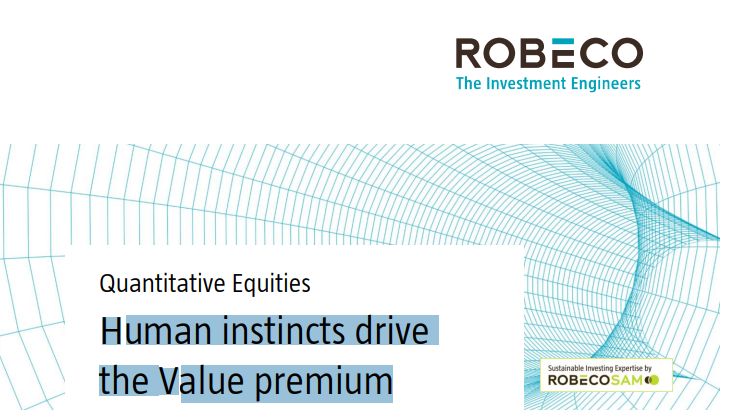In their latest paper titled – Human instincts drive the Value premium, Robeco explain how human instincts drive the value premium. Here’s an excerpt from the paper:
According to the behavioral school of thought, human tendencies are behind the existence of the value premium. Many investors are lured by the appeal of companies with exciting growth stories and prospect of strong short-term returns, while being deterred by those that receive little fanfare or are unloved by the masses.
As explained by Andrew Lo in his book Adaptive Markets, “Intelligence is the ability to generate accurate cause-and effect descriptions of reality” (or, simply put, narratives). This innate skill has been passed down through generations and contributed to the survival of humans throughout time. Therefore, people are hardwired to be favorably disposed to good narratives and they might struggle to overrule or ignore such a strong instinct.
In one paper, researchers discussed how value strategies outperform the market as they exploit the behavioral errors made by typical investors, and not because they are fundamentally riskier. They noted how private investors can extrapolate past growth rates of glamour stocks well into the future even though they are unlikely to persist. They could also equate well-run companies with good investments irrespective of price.
Moreover, their short-term horizons may lead them to shun value strategies which typically require longer-time periods to pay off. Thus, their resulting optimism about glamour stocks and pessimism about their value counterparts give rise to the value premium.
In another study, the authors concurred with these findings as they looked into how irrational behavior impacted the longterm returns of growth and value stocks. They illustrated how investors overreacted to past operating results by naively extrapolating historical growth rates.
This caused them to erroneously invest in growth stocks based on the belief (narrative) that their operating performance would continue unabated, and to avoid value stocks due to their low growth profiles. But over time, they found that once the errors stemming from the naïve extrapolations were realized, investors would then adjust their positions accordingly, causing value firms to outperform their growth peers.
Similarly, recent research examined the factor exposures of passive thematic indices. Thematic strategies typically catch the eye of investors by being exposed to stocks, sectors or themes with good narratives (such as emerging macroeconomic, geopolitical or technological trends) or strong historical returns. The study, however, showed that most of these passive thematic indices had negative exposures to factors, including value. From an asset-pricing perspective, the author concluded that this implies that investors in these indices potentially face lower long-term expected returns.
By contrast, some investors take a conscious and rational decision to go against value. This perspective is also explored in detail in an academic paper. For example, the researchers state that professional investors have career concerns to consider over and above generating good long-term performance.
Demanding bosses and clients also evaluate them on their short-term returns and their ability to beat benchmarks. From a commercial perspective, they are also judged on their capacity to market their investment strategies and create appealing stories around them. Given these concerns, they could opt for more growth style-related approaches which are easier to sell, have more catchier narratives, and potentially offer strong short-term returns relative to ‘unloved’ value stocks.
In recent years, growth stocks with enticing storylines have become very popular investments. This is not surprising, especially with the current ease of investing, proliferation of indicators focused largely on attention-grabbing information (such as recent returns or stock popularity lists) and more visible marketing aimed at luring private investors. With these factors in mind, even the most seasoned investors can become susceptible to the ‘fear of missing out’. But such behavioral biases are likely to strengthen the value factor.
You can read the entire paper here:
Robeco – Human instincts drive the Value premium
For all the latest news and podcasts, join our free newsletter here.
Don’t forget to check out our FREE Large Cap 1000 – Stock Screener, here at The Acquirer’s Multiple:



